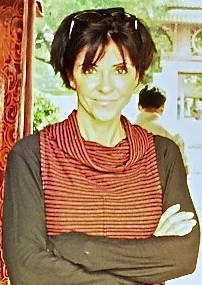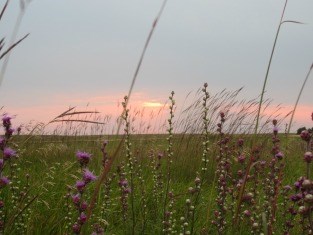MANCHESTER, N.H., Jan. 29, 2014 (GLOBE NEWSWIRE) --
The Heart’s Own Field
Environmental writer Trey Wren has found in a stretch of South Dakota grassland relinquished by Benedictine monks a new home, a rich story, and a mission.
MANCHESTER, N.H., January 29, 2014—‘”Location is the crossroads of circumstance,” wrote Eudora Welty about the importance of place in storytelling. “[It is] the proving ground of ‘What happened? Who's here? Who's coming?’—and that is the heart's field.”
For Tracy Rosenberg—who writes under the pen name of Trey Wren, and is a 2011 graduate of Southern New Hampshire University’s low-residency MFA in Fiction and Nonfiction program—the heart’s field is a thousand acres of western prairie. And the story she is writing about that place is rich in the “crossroads of circumstance.”
We begin in 1950, with a group of Benedictine monks in search of a spot to build a new abbey. They were moved by the beauty of a high stretch of prairie overlooking South Dakota’s Whetstone Valley, near Milbank. Then they learned from a passing farmer that the land had been listed for sale that very week. They went to speak to a banker in Milbank whose name happened to be Benedict.
It seemed, well, providential.
The land was bought, and then Blue Cloud Abbey, a 98,000-square-foot monument of steeple, stone, and stunning stained glass, was built. The abbey prospered over the decades by virtue of its herds of beef cattle and pasturelands, and in 2001 the Benedictines put much of the land into a federal grassland easement. By 2012, however, the number of monks at the abbey had dwindled to 14, with most too old for physical work. That year the order put the abbey and its lands up for sale.
Meanwhile, in Iowa, Tracy Rosenberg had just earned her MFA and was looking to restart her life. Born and bred on a thousand-acre farm there, she had watched her father’s land change in character from grazed grassland to tillable land tracts.
In 1984 she had bought land herself that she terraced and tiled, as her father had, into the top-producing farmland in her county—but at a cost. “Over the years, I’d observed a reduction in wildlife population and species, the result of declining habitat,” she said. “Now I’m a convert—a proponent of maintaining remnant prairie at all costs.”
In other words, she wanted land that reminded her of what Iowa used to be, and then she wanted to keep it that way. In 2011 she sold her Iowa parcel and looked at other parcels in six states. Nothing felt quite right, though, until a friend in the Nature Conservancy alerted her that one of the country’s last pure remaining grasslands was up for sale at Blue Cloud Abbey.
Rosenberg found the land beautiful as well, and felt the same stirrings of providence as the monks had sixty years before. “I’m not Catholic myself,” Rosenberg said. “I’m a born-again Christian of no particular denomination, but I had specifically prayed for purpose, and I felt like this was my answer.”
But her purpose was in the land—not the sprawling abbey—and the Benedictines wanted one buyer for both. Rosenberg went away disheartened. But months later the monks called with an offer for her to lease the land for a year while they searched for a buyer for the abbey. The land would have to sit idle, though.
“I asked if I could at least live on the land,” said Rosenberg, who knew that the land was in dire need of rest from overgrazing anyway. “I told them that I wrote creative nonfiction, that I wanted to bear witness to the land’s regeneration, and—through literary art—convey its transition from that which is worn to what is restored.”
On that leap of faith, Rosenberg moved into the abbey’s hermitage, a tiny 275-square-foot shelter furnished with little more than a cot and a desk. She kept a journal, posted a blog, and reached out to environmental organizations, government agencies, and local experts on the conservation, rehabilitation, and future use of the land.
In the end buyers were found for the abbey building. “A group of private investors, all Catholic families from different walks of life, “ Rosenberg said. “They’ve formed a nonprofit to keep the abbey alive by hosting retreats and faith activities. It’s called Abbey of the Hills, and they need donations.”
And Rosenberg herself now owns a portion of earth she has christened the Abbey Grasslands of the Prairie Coteau. This includes a campground once made available for rent by the monks, which Rosenberg intends to rent out as well, and pasture lands that she’ll lease for grazing on a rotating and sustainable basis.
A certain grave sadness attends the departure of the monks who gave so much of themselves to this land, but Rosenberg’s book will bear witness to that as well.
“One thread of the narrative will be the land itself, its ecology and restoration,” she said. “Another will be about my own journey, the process of throwing aside convention and following my heart. And the third will describe the closure of the abbey, and the dignity of these men who vowed faithfulness to this place, but who now find themselves displaced. The tension of the story will rise from the dissonance between these elements.”
Richard Adams Carey, an environmental journalist and assistant director of Southern New Hampshire’s MFA program, eagerly awaits the finished product. “This was one of the special goals of our program when it was founded,” he said. “Sometimes it gets simplified under the rubric of ‘nature writing.’ But stories that are rooted in place like this speak very directly to the human spirit, and we have on hand writers and faculty members like Craig Childs, Mark Sundeen, and Amy Irvine McHarg to plant the seeds of such narratives.”
Tracy Rosenberg, or her alter ego Trey Wren, has sown her seed in a place that is indeed a crossroads of circumstance, and a personal proving ground. She has taken her own vow of faithfulness to its vistas of prairie clover and switch grass.
Now begins the restoration—and its story.
Photos accompanying this release are available at:
http://www.globenewswire.com/newsroom/prs/?pkgid=23293
http://www.globenewswire.com/newsroom/prs/?pkgid=23294
CONTACT:Richard Adams Carey
r.carey@snhu.edu
603.284.7064 (o)
603.716.4278 (c)

